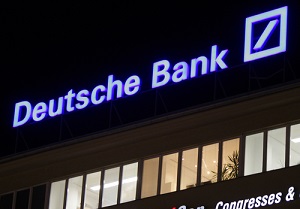 Despite being the fourth-largest bank in Europe with over $2 trillion in assets, Deutsche Bank's (NYSE: DB) collapse is a huge possibility.
Despite being the fourth-largest bank in Europe with over $2 trillion in assets, Deutsche Bank's (NYSE: DB) collapse is a huge possibility.
It simply doesn't have the free cash flow necessary to pay the $5.4 billion Department of Justice settlement issued on Sept. 30. Currently, Deutsche Bank reports its free cash flow as $2.4 billion as of June.
What's more, the German government doesn't want to bail out the bank. German Chancellor Angela Merkel has repeatedly refused to say whether the government will have the funds necessary to do so.
"We naturally hope," she said to reporters on Sept. 27, "even if there are temporary difficulties that things will develop positively."
Without a bailout, Deutsche Bank's fate seems sealed...
You see, earlier in September, analysts at JPMorgan Chase & Co. said a U.S. settlement of $3 billion would render Deutsche Bank unable to settle other legal issues, according to Bloomberg. Any additional $1 billion in settlement charges would erode the bank's capital by a staggering 24 basis points, the analysts said.
That would be a huge blow to pensioners, savers, and other Deutsche Bank customers.
"Central banks around the world are continuing to promote excessive stimulus - just like they did before the Great Depression."
But it gets even worse.
DB's collapse could take the rest of Europe - and even the global economy - with it.
And the result would look eerily similar to the Great Depression, according to Deutsche Bank's chief economist...
How DB's Collapse Could Cause the Next Great Depression
[mmpazkzone name="in-story" network="9794" site="307044" id="137008" type="4"]
The European Central Bank's policies have been crushing Eurozone financial institutions. And Deutsche Bank hasn't been spared. It has faced tough capital requirements and other strict regulations from the ECB. For instance, the ECB's negative-interest-rate policy (NIRP) actually charges Deutsche Bank for holding its money at the central bank. Furthermore, the ECB's supportive policies have hurt DB's ability to retain its earnings to build its capital, according to David Folkerts-Landau, a chief economist for Deutsche Bank.
Landau said the ECB's policy must change course - or else banks around the world will face similar consequences to those during the Great Depression...
That was when the Federal Reserve permitted more than a third of U.S. deposits to be decimated through bank failures.
In a June 8 research paper, he wrote, "In the 1920s the Reichsbank thought it could have 2,000 printing presses running day and night to finance government spending without creating inflation."
"That was a hundred years ago but mistakes keep happening despite all the supposed improvements to central banking, from independence to better data and more sophisticated theoretical and econometric models," he continued.
Central banks around the world are continuing to promote excessive stimulus - just like they did before the Great Depression.
And it doesn't look like the ECB will ease its harmful policies against banks anytime soon, either. The ECB is too committed to its current policies of negative interest rates and monetary easing.
That's worrying because Deutsch Bank can't take much more pressure from the central bank.
You see, DB has over $42 trillion in derivatives on its books. That astronomical number is about 14 times the size of Germany's $3.3 trillion economy, and twice the size of the European Union's $16.3 trillion gross domestic product.
"Deutsche Bank doesn't have the cash to settle its own legal troubles, let alone any 'surprises' that might come its way," said Money Morning Chief Investment Strategist Keith Fitz-Gerald to readers on Sept. 30.
Also consider that DB stock, which is currently trading at $13.17 per share as of Oct. 4, is down nearly 91% from its high of $141.17 on May 4, 2007. Most people won't touch the stock with a 10-foot pole - and for good reason.
We say most people, because some have actually found a way to profit from failing stocks like Deutsche Bank's.
One of those people is Money Morning's Michael Lewitt, a prominent money manager who has built top-ranked hedge funds over his 29-year career.
And for the first time ever, he's sharing his strategy with readers.
So while Europe's banking system continues to suffer - and could lead to a gigantic financial meltdown - you can be profiting.
Don't believe it? See Lewitt's strategy for yourself, right here...
Follow us on Twitter @moneymorning and like us on Facebook.


